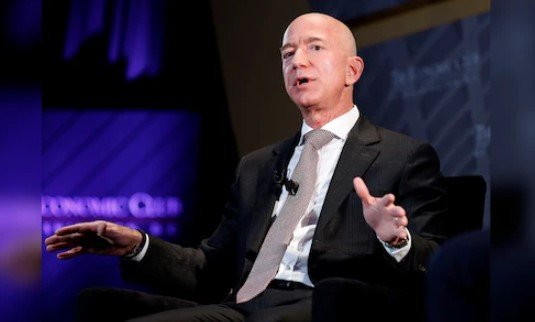May 2, 2025 — Seattle, WA — In what appears to be a trend-setting statement, Bezos, the founder of Amazon, disclosed plans to sell an estimated 4.8 billion dollars’ worth of Amazon stock. Similar reports suggest this will trigger movements across Wall Street and Silicon Valley. This information was published in a recent document with the U.S. Securities and Exchange Commission (SEC).
Bezos’s plan, which is part of a pre-arrangement trading scheme set into place early this year, would result in a staggering 25 million shares being stripped off Amazon.com Inc. Although this announcement technically does not convey a negative sentiment regarding Amazon’s future, analysts and investors are dissecting the disclosure in order of its calculation and level with extreme attention.
A Billionaire’s Rebalancing
Although Bezos stepped down as the Chief Executive Officer in 2021, he continues to hold the post of executive chairman on the board, resulting in him being one of the few directors to retain authority at Amazon after repeated major personnel shuffles. Bezos’s reputation for selling shares and funding ventures, outside the realm of the tech conglomerate, is well documented. These self-funded initiatives include his aerospace company Blue Origin, the Bezos Earth Fund, which is dedicated to climate change advocacy, and various media and real-estate business ventures.
This latest selling portion will be done under a 10b5-1 plan as per the SEC filing, which is a regulated structure that gives corporate insiders the right to sell shares at predetermined intervals, avoiding insider trading allegations.
“Jeff Bezos continues to be deeply engaged in Amazon’s long-term success,” an Amazon spokesperson stated. “His broader financial strategy dictated that this sale was necessary to diversify his assets.”
Although this explanation, the markets still reacted negatively. During early Thursday trading, the company’s stock dipped 1.9%, regaining some losses by the afternoon.
Strategic versus Opportunistic Timing:
Analysts seem to be particularly fixated on the reasoning behind the announcement’s timing. Following a positive earnings report for Q1 and robust outlooks for AWS cloud and Prime services, Amazon’s shares are sitting near their 52-week peak. The company’s stock has risen over 30% in the last six months due to heightened consumer spending, increased enthusiasm regarding AI, operational efficiencies, and a series of new product releases.
“From a market perspective, this is a textbook move,” noted Karen Liu, senior equities analyst at MorganBridge. “Bezos is capitalizing on a period of strength, which is entirely rational. But when someone of his stature liquidates billions in stock, it invariably raises questions.”
Some industry watchers conjecture that Bezos might be trying to position himself to inject more funds into Blue Origin, which is marketing itself as a competitor to Elon Musk’s SpaceX for NASA contracts and deep space exploration missions.
Others believe the maneuver could be part of a bigger scheme to adjust Bezos’ portfolio in anticipation of tax changes expected to be introduced by the Biden administration, which would impact capital gains for ultra-high-net-worth individuals and their taxed significantly devalue their wealth.

The Bezos Blueprint: From E-Commerce to Earth and Space.
After stepping back from Amazon’s day-to-day operations, Jeff Bezos has started to reimagine and reshape his public persona. Self-identifying as an entrepreneur first, he seems to rather strategically focus on how and not what the future would hold.
The Bezos Earth Fund plans to put significant investments towards carbon removal technologies, biodiversity, and regenerative agriculture. Along with these efforts, the Fund aims to distribute over $3 billion in global climate grants. In a public statement a few weeks ago, Jeff Bezos said he aims to “see measurable results within a decade.”
Simultaneously, Blue Origin has accelerated its programs for lunar exploration, proposing a moon lander set to be launched in late 2026. These entrepreneurial ventures will require a considerable amount of money alongside an innovative, long-term plan. This indicates that Bezos’s sale of Amazon stock could likely fund these ventures.
“It’s not just a stock sale. It’s part of a long-term vision,” said tech investor and futurist Rayna Collings. “Bezos is divesting from one empire to build others — on Earth and beyond.”
What It Means for Amazon
Andy Jassy, the current CEO of Amazon, has been credited with guiding the company through the post-pandemic turmoil, restoring operational productivity. Optimizing AI capabilities, fine-tuning logistics, and expanding internationally are new focuses, leading to reliable internal forecasts stating that Amazon is on solid footing.
Though Bezos has partially divested, he remains a significant stakeholder. After the planned sale of 4.8 billion dollars worth of shares, he would still maintain roughly 9% ownership, thus retaining his influence as a principal shareholder.
Corporate governance scholars argue that such sales, particularly when executed through predetermined mechanisms, seldom suggest a lack of confidence in the underlying business.
“This might set off alarm bells if there was no context for the sudden sale, but in this case, Bezos has been structured in his liquidation of equity for years,” said Roth, a corporate finance professor at NYU. “That’s not seeming to suggest where Amazon’s leadership wants to head.”
Boeing’s spokesperson declined to comment on Bezos’s stock sale, focusing instead on remarks CEO David Calhoun made during a January conference. “Some of that negativity personally concerns me because I haven’t yet met half of the equity owners.” While more than half convert to a skewed dictatorship, it’s liquidatable alone.”
Still, alongside all sentiments, Bezos employees and Amazon shareholders have complicated emotions attached to the value of such stock sales. Many shareholders who have held their shares for many years intensely associate Bezos with the initial blueprint of Amazon, and that tends to trigger his moves as signs, intentional or otherwise.
A More General Pattern Among Tech Billionaires
Bezos is not the only one of the 2025 tech titans to execute major equity trades. In January, competitor Musk lost $3 billion worth of Tesla shares to HRX.ai and numerous other AI-related projects. Consistently, Mark Zuckerberg sold 1.2 billion dollars of Meta Platforms shares in sequences with the intention of financing the Chan-Zuckerberg Initiative and further spending on virtual reality.
They all demonstrate one overarching point: tech billionaires now use their wealth not only to grow their businesses, but also to finance unimaginable philanthropic endeavors, personal dreams, and establish globally impactful sociopolitical infrastructure.
“It’s virtually a second act for these visionaries,” explained Meghan Torres, director of the Center for Tech and Society. “They’re shifting from shareholder value to legacy.”
Table of Contents
Stakeholders Remain Cautious
Regardless of assurances offered by Amazon and financial analysts, shareholders will remain vigilant during the implementation of the sale. Any movement in share price or strategic change could invite renewed scrutiny.
For the time being, Amazon retains its position as the largest player in e-commerce, AI, and cloud computing. Bezos stepping out from the day-to-day activities of the company seems to be more a matter of philosophy than economics.
But the scale of his intended sale and the lack of communication from Bezos will keep speculation alive on Wall Street.
“What Jeff does next matters,” comments Liu of MorganBridge. “Be it climate, rockets, or something else completely unexpected — he continues to change the world. Just not from the inside of the walls of Amazon’s headquarters.”



